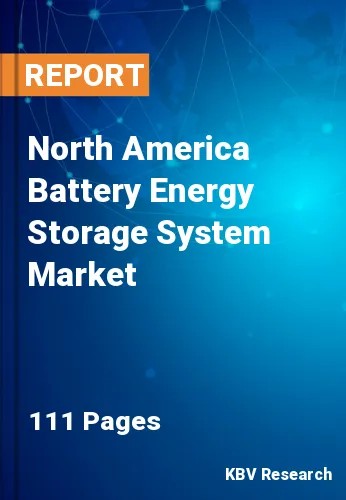The North America Battery Energy Storage System Market would witness market growth of 24.4% CAGR during the forecast period (2021-2027).
The Battery Energy Storage System (BESS) is a device that uses specifically built batteries to store electric charge. The underlying concept is that such energy can be used at a later time. A significant amount of research has resulted in battery advancements, which have helped to turn the notion of a Battery Energy Storage System into a commercial reality. In addition, BESS is beneficial over other storage systems in that it has a small footprint and no geographical limits on where it may be installed. Other storage methods, including pumped hydro storage (PHS) and compressed air energy storage (CAES), are only appropriate for a small number of places due to water and siting restrictions, as well as transmission constraints.
Over time, battery energy storage system technology has established itself as a vital product for transforming, storing, and distributing extra electricity for later use, as well as lowering CO2 emissions. In addition, the expansion of the Battery Energy Storage System market has been propelled by rising population, fast industrialization and urbanization, and increased use of Battery Energy Storage technologies like lithium-ion batteries, flow batteries, lead-acid batteries, and others. Moreover, the government's strict environmental rules have a significant impact on the market for Battery Energy Storage Systems.
Some of the key trends of the regional market are advantageous R&D activities to specify cost-cutting goals, detailed BESS installation standards, and economic support programs & rebates. For example, experts from the United States National Renewable Energy Laboratory (NREL) agreed that they would use advanced Machine-Learning (ML) techniques to broaden their understanding of novel battery chemistries, materials, and cell designs. The physics-based ML technology's complicated algorithms are expected to help in the characterization of battery safety, longevity, and performance.
Solar PV and wind power, both of which are noted for their unpredictability, provide for a large portion of the United States' renewable energy potential. Thus, this condition necessitates the development of more efficient battery energy storage technologies.
The US market dominated the North America Battery Energy Storage System Market by Country in 2020, and would continue to be a dominant market till 2027; thereby, achieving a market value of $2,996.9 million by 2027. The Canada market is experiencing a CAGR of 27.2% during (2021 - 2027). Additionally, The Mexico market would exhibit a CAGR of 26.1% during (2021 - 2027).
Based on Ownership, the market is segmented into Utility-Owned, Third-Party Owned, and Customer-Owned. Based on Battery Type, the market is segmented into Lithium-Ion Batteries, Advanced Lead-Acid Batteries, Flow Batteries, and Others. Based on Energy Capacity, the market is segmented into Above 500 MWh, Between 100 to 500 MWh, and Below 100 MWh. Based on Connection type, the market is segmented into On-grid, and Off-grid. Based on Application, the market is segmented into Utility, Commercial, and Residential. Based on countries, the market is segmented into U.S., Mexico, Canada, and Rest of North America.
Free Valuable Insights: The Global Battery Energy Storage System Market is Estimated to reach $14.5 Billion by 2027, at a CAGR of 25.2%
The market research report covers the analysis of key stake holders of the market. Key companies profiled in the report include General Electric (GE) Co., Honeywell International, Inc., Panasonic Corporation, Hitachi, Ltd., Siemens AG, Johnson Controls International PLC, Toshiba Corporation, LG Energy Solutions Ltd., and Samsung SDI Co., Ltd.
By Ownership
By Battery Type
By Energy Capacity
By Connection type
By Application
By Country
Our team of dedicated experts can provide you with attractive expansion opportunities for your business.

